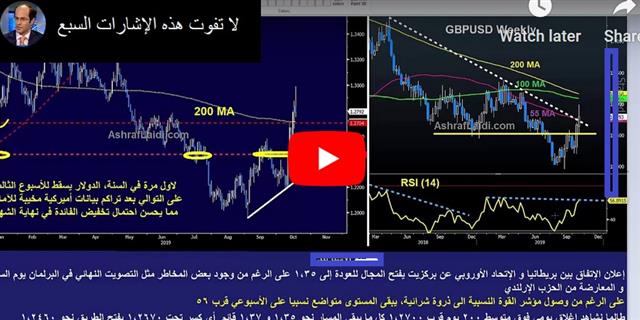What if Parliament Votes No?
Obtaining the required 320 votes to back Saturday's passing of the Brexit deal will be tough but not impossible. If the deal passes, we expect gaps in cable to as high as 1.3180s. How about if Parliament rejects the deal? Will it depend on the margin of defeat? Will a rejection by a 2-vote margin have a different GBP impact than 15-vote margin? We saw how GBP retreated on Thursday when the DUP said it will vote against the deal in parliament, making unlikely the deal will pass in its current form. More on the necessary numbers in here. As I write this, GBPUSD has spiked 0.3% to 1.2932 on reports that the Brexit deal will be passed tomorrow.
لا تفوت هذه الإشارات السبع (فيديو للمشتركين - خاص قبل عطلة نهاية الأسبوع)
Boris Johnson's strategy is to turn Saturday's meaningful Brexit vote into a do-or-die situation. The Benn amendment took away his ability to execute a no-deal Brexit so he has tried to get the EU to manufacture one. If he convinces the EU to reject a Brexit extension in case of a "No" on Saturday, then it will sway a few more desperately-needed votes in his favour.
But it's all a bluff. Merkel, Macron and other EU officials have said time and time again that the EU shall not be the reason there is a hard Brexit. Juncker tried to create some ambiguity and it seems to have had some effect on the market but parliamentarians aren't likely to be deluded on Saturday. It's not a choice of this deal or no deal. It's a choice of this deal, or extend. Depending on the extension, there's a chance that elections and 2nd referendum chatter could resurface, which may not be such a bad thing for sterling.
The DUP appears to believe it can get a better deal. The leadership Thursday said 'this isn't even the beginning of the end'. There is also the question of whether there is time for a legal text and assessment before Saturday; something that could sway other voters.
So what happens next?
In the event of a "No" outcome, an election remains the most-likely way forward but it isn't as likely as it was a month ago. The problem for opposition parties is that it looks like they will lose and Boris will gain a larger majority, possibly with a few of the trouble-makers in his party ejected. With a larger majority, he could easily pass this deal and may even try to press the EU for more.Labour has sensed this and they're having second thoughts about pushing for an election. They were banking on Johnson not being able to get any changes to May's deal (as the EU long promised) and being forced into an embarrassing climb-down from his Oct 31 pledge. Instead, he's got a fresh deal and he can now blame Labour and others for sabotaging it if it fails. With that, Labour may be shifting strategies towards calling for a new referendum. Corbyn isn't yet comfortable with it but it's more likely than a week ago.
What about the market? A deal failing to get through parliament will weigh on GBP but the risks are two-sided headed into the weekend and the market is short, so there may be a drift higher in GBP, baring any fresh headlines.
If there is a dip or a drop, it's likely an opportunity to buy. The important thing this week is not that the DUP is against the deal, but that Boris has a deal that can be supported by the the ERG. When it passes is probably only a matter of time.
A GBPUSD Premium trade is currently open with supporting charts and notes.
The risk is that Labour and the LibDems somehow force a fresh referendum. That would add considerable fresh uncertainty and a deeper dip. But ultimately it's a win-win for the pound in that either the UK stays in the EU or this deal is accepted and the uncertainty is removed. ِ
Latest IMTs
-
Iran Polymarket & Fed Odds
by Ashraf Laidi | Feb 20, 2026 11:27
-
Gold, Iran & Oil
by Ashraf Laidi | Feb 19, 2026 16:40
-
Trade Already in Profit
by Ashraf Laidi | Feb 17, 2026 18:16
-
I will go LIVE in 10 mins
by Ashraf Laidi | Feb 16, 2026 21:49
-
3 Stocks Against Nasdaq
by Ashraf Laidi | Feb 13, 2026 17:46









